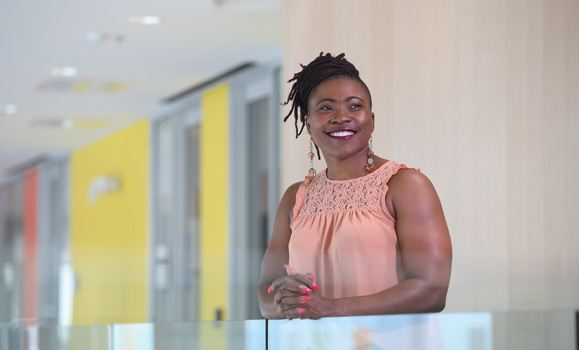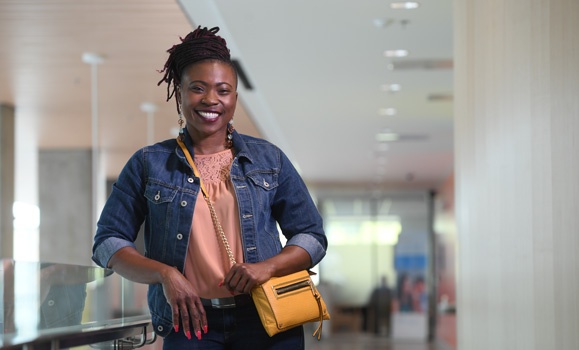This article is part of a series focusing on the grads of the Dalhousie Class of 2019. Spring Convocation kicked off May 10 in Truro, with Halifax ceremonies from May 27 to June 1. Read all our profiles here, and for more information visit the Convocation website.
When Geneive (Charisma) Walker came to Canada from Jamaica six years ago, she was looking for more than just a change of scenery. She had worked for nearly three years as a nurse before deciding to emigrate to Canada – and find a new career that better suited her interests. She was looking for something more people-centric, and had thought about going into therapy and so she first enrolled at Dalhousie University with her eyes set on psychology.
After a year and a half of studying psychology, Charisma came to realize that this field was a bit too on the science side for what she wanted, as she was looking for something more people-oriented.
Charisma found courses in sociology and philosophy to be quite interesting. An introduction to sociology course taught by professor Christopher Helland first opened her eyes up to the Department of Sociology and Social Anthropology in the Faculty of Arts and Social Sciences and what it had to offer.
“I chose this department because the courses studied people and culture, which is what I really love learning,” Charisma says. “So when I realized there was an option for social anthropology, then I was like, perfect! This is exactly what I wanted.”
Charisma did her introduction to social anthropology courses with professor Martha Radice, who she credits for giving her the tools and putting her on the path to pursue a BA with combined honours in Social Anthropology and Psychology.
“It has opened up a whole new world for me, just in the way of how I think about people, how I think about the world around me. I see through different eyes now, and I love that."
Working with youth of African descent
Last summer, Charisma had the opportunity to travel to Ghana to attend a pan African youth conference as part of the Nova Scotia youth delegation group (which was organized by Dr. Barbara Hamilton-Hinch, professor of Recreation and Leisure Studies, Faculty of Health). The conference included participants that were first generation Africans, as well as participants from Caribbean countries.
Charisma went into this conference wearing her social anthropological lens. She noted that this conference, which is put on by the African youth and governance conference in collaboration with the youth bridge foundation in Ghana, usually only hosts participants that live in Africa – but this year was significant. It was the first year, in all its 10 years, that the conference hosted delegates from the western world — people from the diaspora.
Charisma explains that Ghana has designated itself as the “home” for people in the diaspora who want to return to Africa. And so Charisma wanted to learn about how this experience affected the participants — especially her fellow delegates who had never been to Africa before, and how this affected them as far as “going home” to their homeland since their ancestors left as part of the diaspora.
“There was a mixed group at the conference, and so I anticipated that everyone would have a different experience, which was the case,” explains Charisma. “So I wanted to look at it, as a novice anthropologist.” She wanted to make her experience meaningful, so she conducted interviews with her fellow Nova Scotian delegates and ended up turning this project into a directed reading course with Drs. Radice and Hamilton-Hinch.

Dr. Radice is incredibly proud of Charisma for her work on this project. "Charisma's openhearted enthusiasm and thirst for knowledge are infectious,” she says. “It was exciting to work with her to help her theorize a genuinely new social and cultural experience. I felt like I learnt as much as she did from the reading course on African Diaspora Identities she did with me — our conversations about race, roots, and routes have really stayed with me."
“I was pretty excited about [the project] to the point that I couldn’t sleep!” says Charisma. “It was very touching to write about it. To come home from the conference, and to have to unpack all of that personally, and for the people that were giving me their experience and what it felt like for them. I was very happy that I was able to capture that for them and to give them the opportunity to read it. They were pretty excited about that as well.”
Creating connections
Charisma’s experience in Ghana and her experience with her directed reading course inspired her idea for her thesis (supervised by professor Laura Eramian of the Department of Sociology and Social Anthropology). The thesis title was “The home I never knew”: Understanding how Blacks’ connection to Africa transcends interaction with African and its culture.
She explains that she collected her data through interviews and her research concluded that “Africa is seen as the source, the root, the motherland…they refer to it as ‘home’ even though home inspires this intimate knowledge and place of solace and interaction, you know, an experience.”
“Because participants do not have an experience with Africa and its culture, they connected their identity to their nationality and what’s tangible to them. In the same breath, wherever their ancestors were deposited during slavery, they brought with them the African culture. And so there is always this undeniable essence of Africa, the language, the food, in the music, everywhere you turn, everything that defines culture is there, and you cannot ignore it,” she says. “So it’s kind of like a ghost in the sense that we are still able to connect it through that but indirectly. So it’s still the same essence, they acknowledge it for being the foundation and for being that anchor for who they are, but for some it’s not active enough for them to recognize it in their identity.”
Charisma adds that her experience working on this thesis was very profound, self-reflective and emotional.
“[The thesis question] was not just a question for my participants, but also to me. There are some things that there are just no words for, because you never thought about it before. Like, we live our lives here but there are so many things that we do but we don’t know why do we do these things? It’s not all based on where you’re from, but also your socialization.”
Improving health and wellness
In addition to being a full-time student and mother to a teenaged daughter, Charisma spent the last three years working a full-time job as a health coach with Diabetes Canada.
“It took a lot of organization!” she says with a laugh.
She explains that the position was to facilitate lifestyle changes aimed at improving the health and wellness of African Nova Scotians by supporting and achieving their identified wellness goals as well as connecting them to resources within their community essential to positive health outcomes.
Charisma describes this experience as wonderful and fulfilling. And it drew on her past experience working as a health care practitioner plus the new social anthropological and psychological frame of mind that she built through her studies at Dal.
“I always think we win when we have support in any way. I've seen that throughout my career, even as a nurse, people will live longer because there's a support system. Just knowing that somebody cares, or there’s one who can point you in the direction to where you can go to get help. This position was very fulfilling and rewarding, because what made it so unique is that people would identify the life changes they wanted to make, and then my job was to help them to make that happen. So it is more them than me, which is the whole idea, and what makes it so successful. And this experience also highlighted a lot of the barriers that the African Nova Scotian community is confronted with, such as accessibility and affordability for food, and basic necessities."
Charisma’s time pursuing her degree plus her time working as a health coach has confirmed her gut feeling that a career that will focus on working with and helping people, like counselling or supporting marginalized groups, and continuing to be a role model for her teenaged daughter, are what remain on her horizon.

